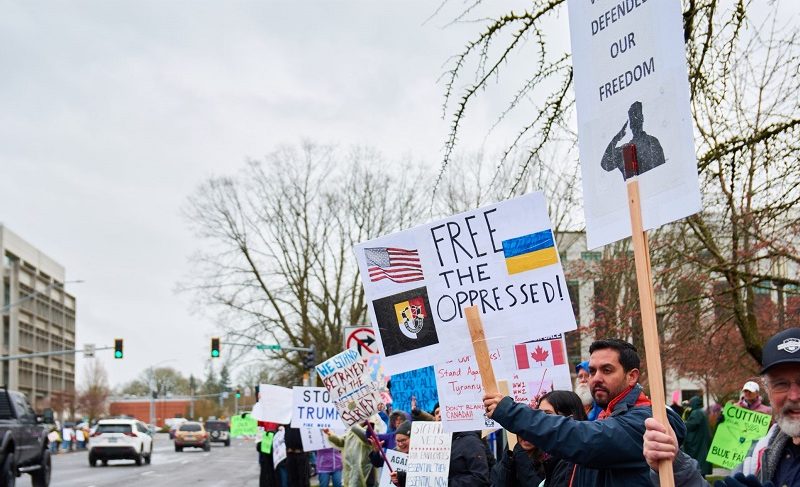Salem, OR – On Friday, at least 500 people, including military veterans, gathered in Salem to protest the Trump administration’s recent changes to the Department of Veterans Affairs (VA). The march, which drew a diverse group of veterans and their supporters, was a demonstration against policies they say undermine the care and services veterans have long relied on.
The protestors expressed their concerns over several key reforms, which many believe threaten the quality and accessibility of healthcare for those who have served in the U.S. military. Specifically, the protest centered around the expansion of private healthcare options, changes to disability claims processes, and cuts to veteran services. Critics argue these moves, which were part of broader efforts to privatize government services, could lead to long-term deterioration in the care provided to veterans.
“This is not just a political issue for us; it’s personal,” said Richard Thomas, a Navy veteran who served in Vietnam. “We fought for our country, and now we’re fighting to make sure we get the care we deserve when we come home. These changes aren’t helping us—they’re hurting us.”
Many protestors also voiced their disapproval of the leadership at the VA under the Trump administration, particularly Veterans Affairs Secretary Robert Wilkie. They argued that the VA’s mission of providing timely and efficient care is being compromised in favor of private-sector interests.
The march, which began at the Oregon State Capitol, was a peaceful event that featured speeches, chants, and the waving of American flags. Participants called on lawmakers to halt or reverse the proposed changes, demanding that veterans’ needs remain a top priority.
Though the protest was focused on the Trump administration, it also served as a broader call to action for veterans across the nation to continue advocating for their rights. Many expressed frustration with the ongoing challenges faced by veterans, including long wait times for medical appointments and an overloaded claims system.
Veterans’ advocacy groups have warned that these changes to the VA are a part of a larger trend toward privatization, which they say could put profits over people, especially those who rely on the VA for essential services.
As the march came to a close, participants vowed to continue their efforts, promising to hold lawmakers accountable and to ensure that veterans’ voices are heard in the ongoing debate over the future of the VA.
“We’ve earned these benefits. We’ve earned this care,” said another protestor, Emily Harris, a Gulf War veteran. “And we’re not going to let anyone take that away from us.”











